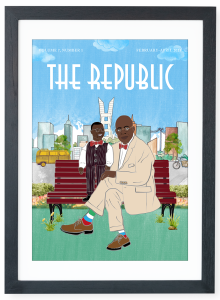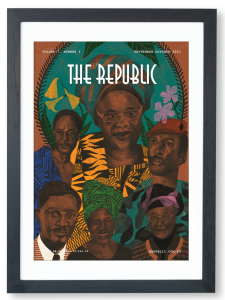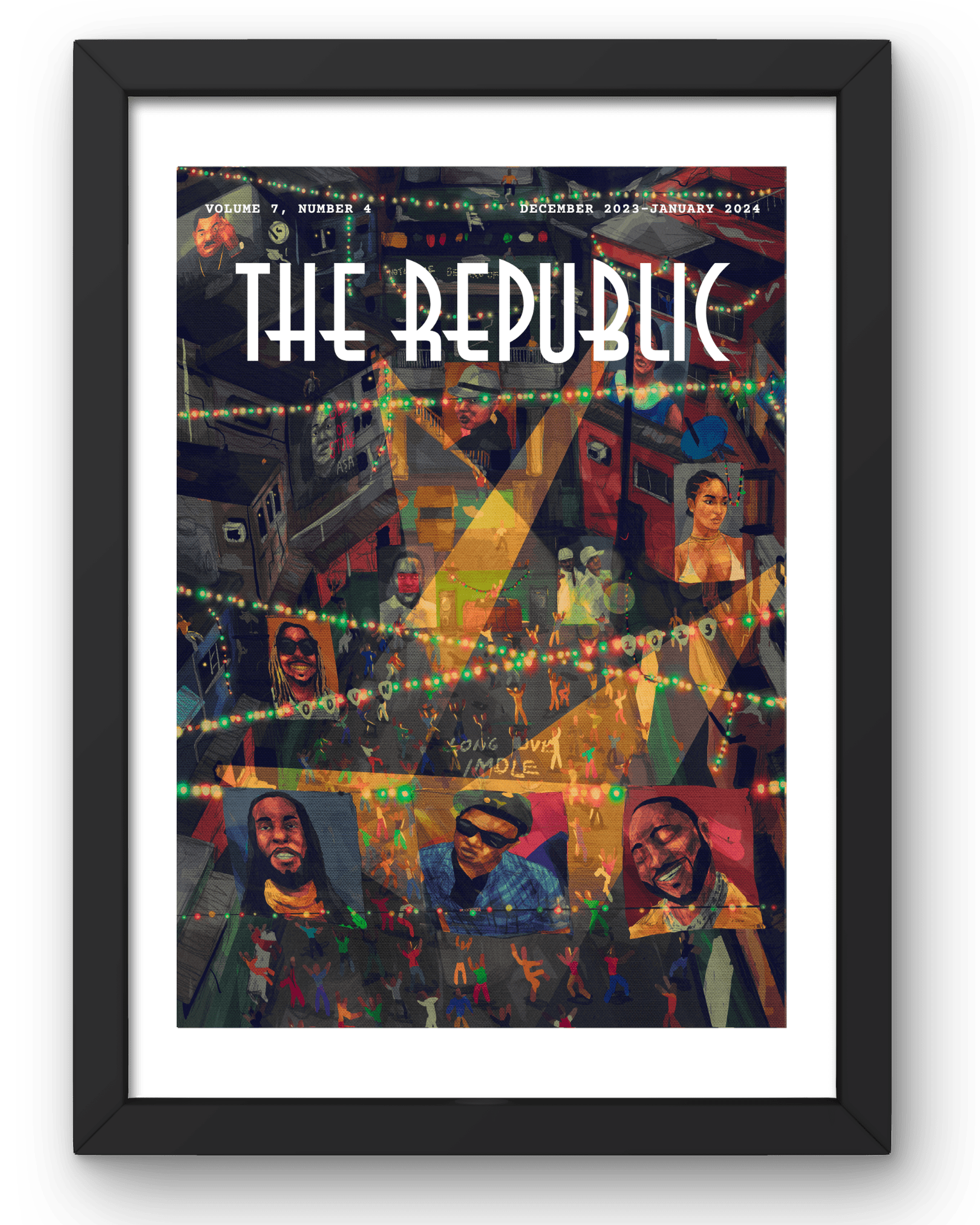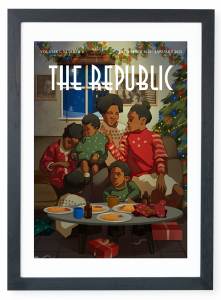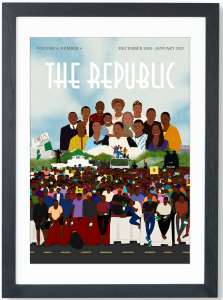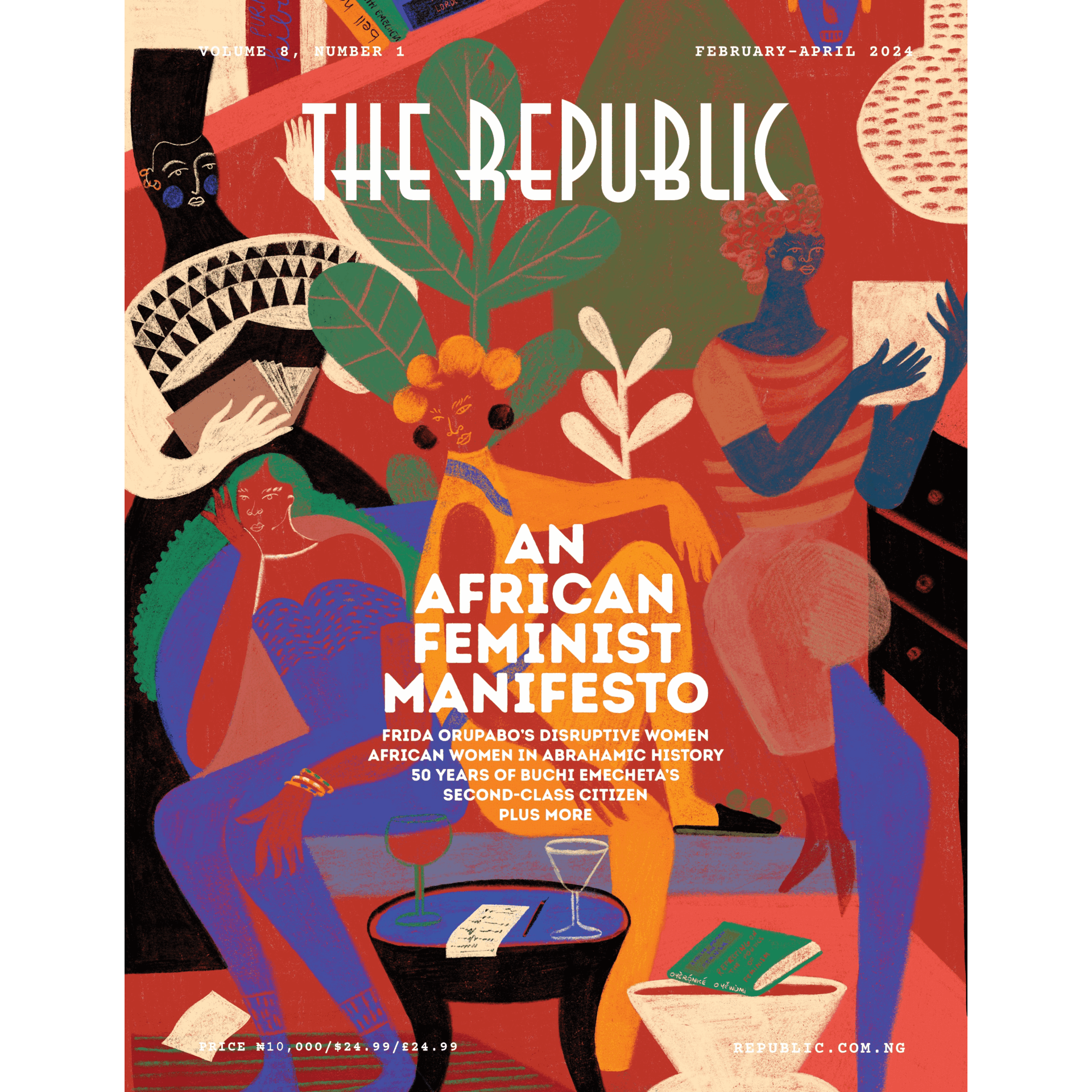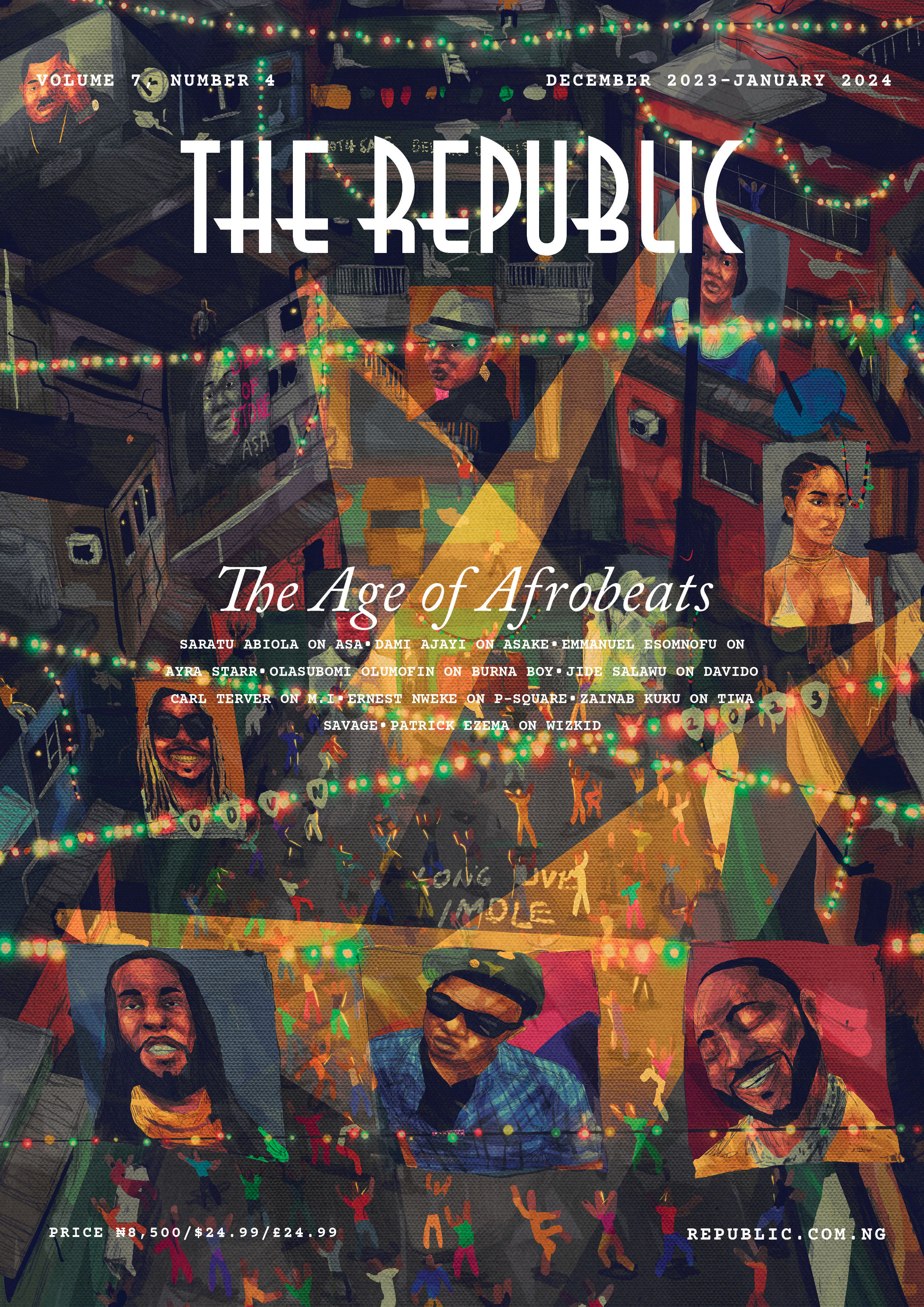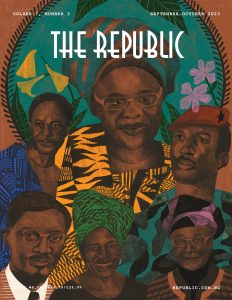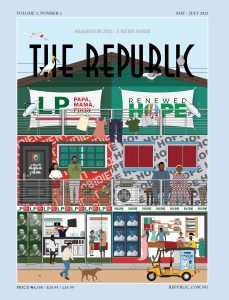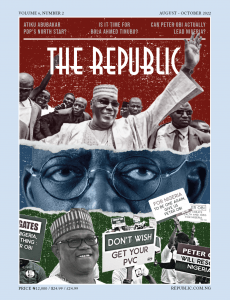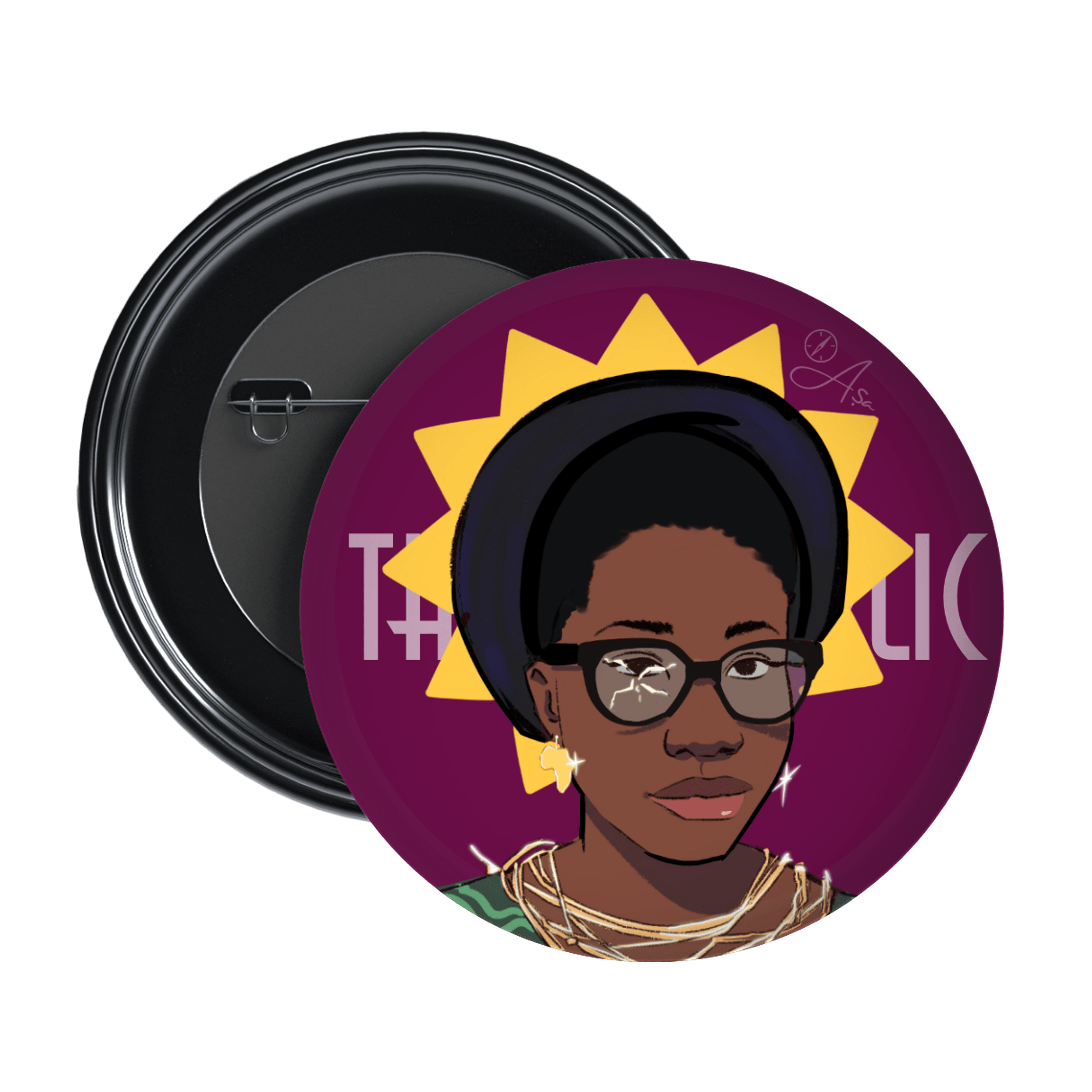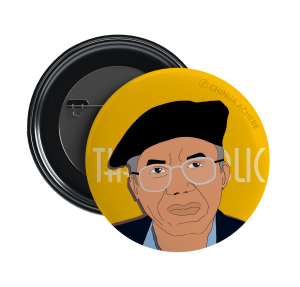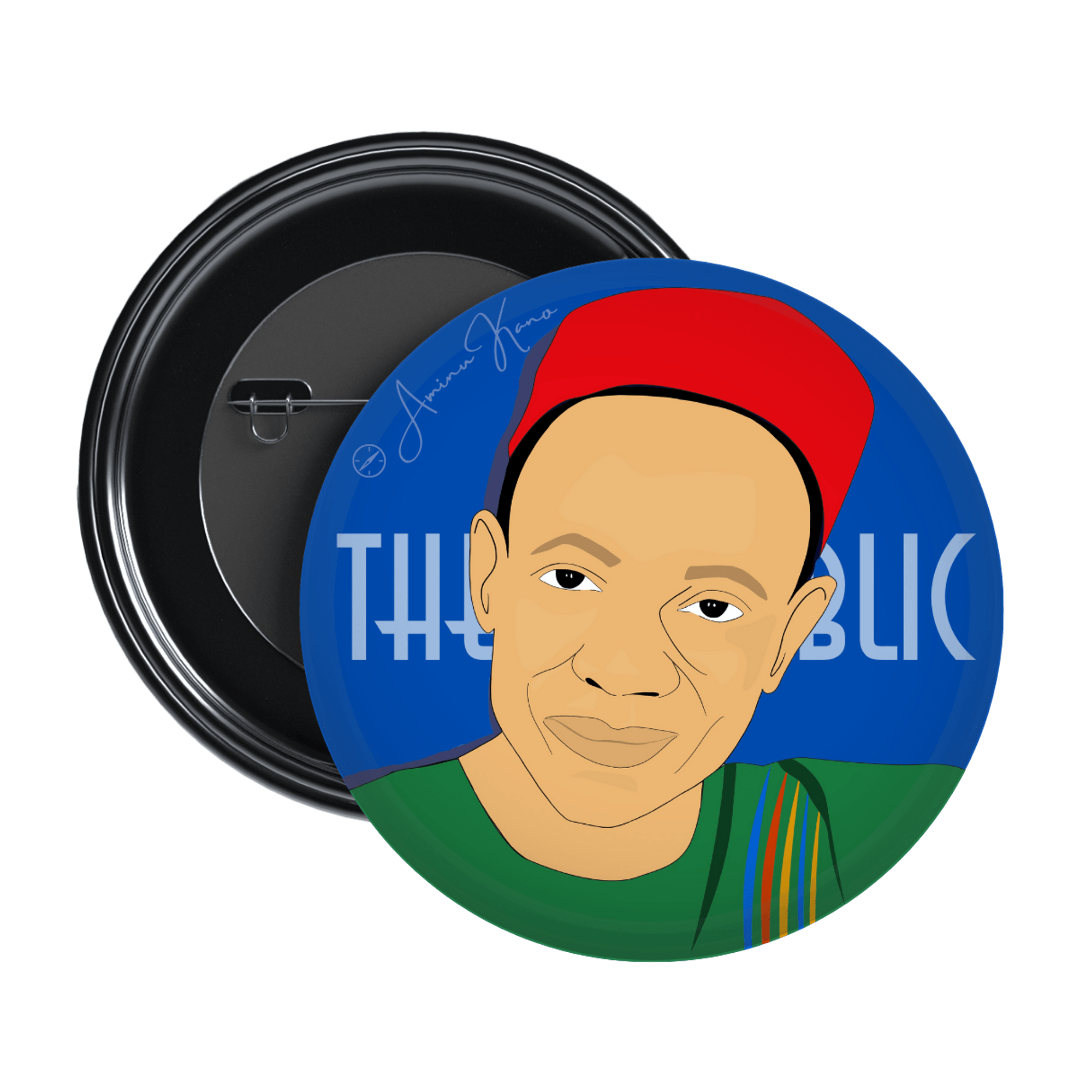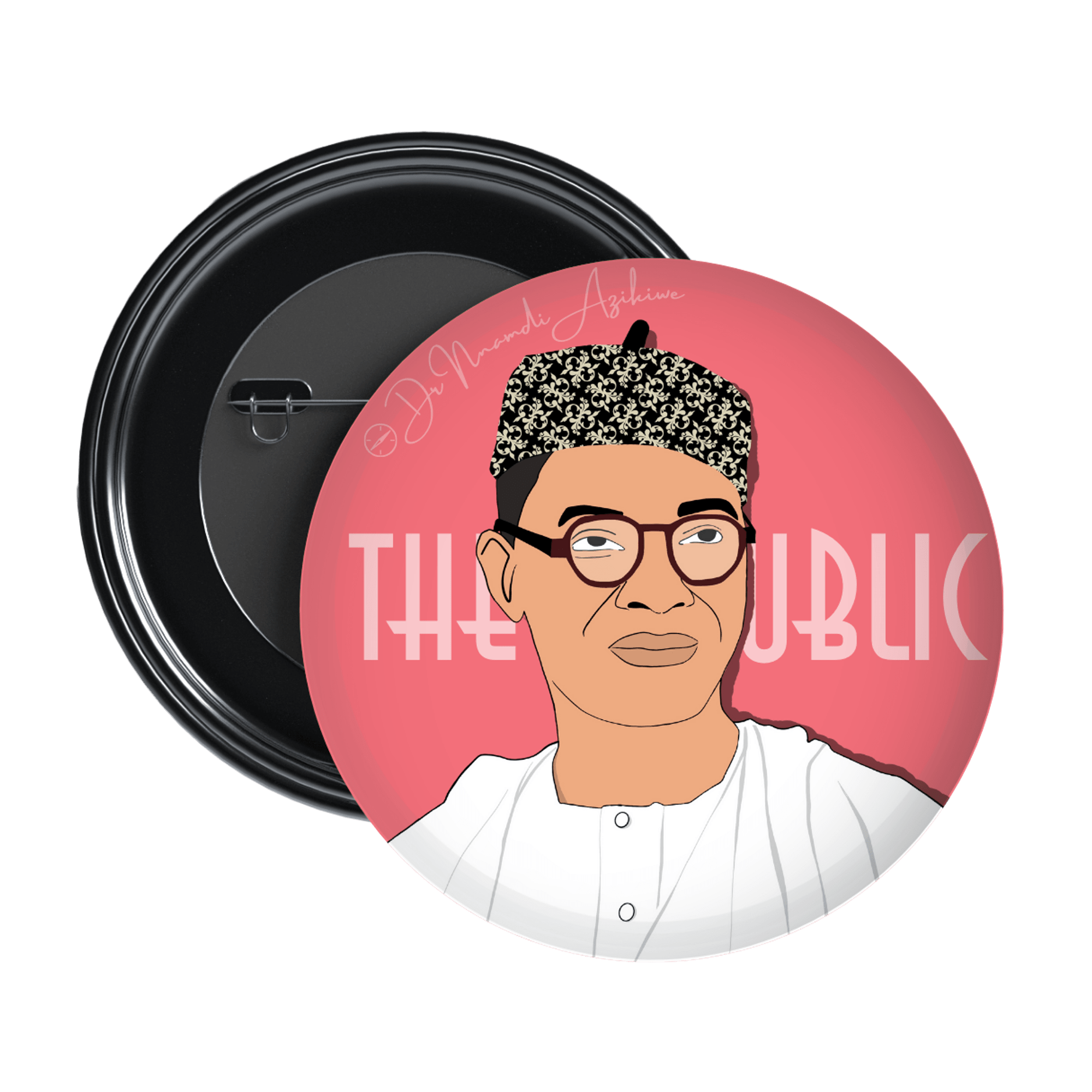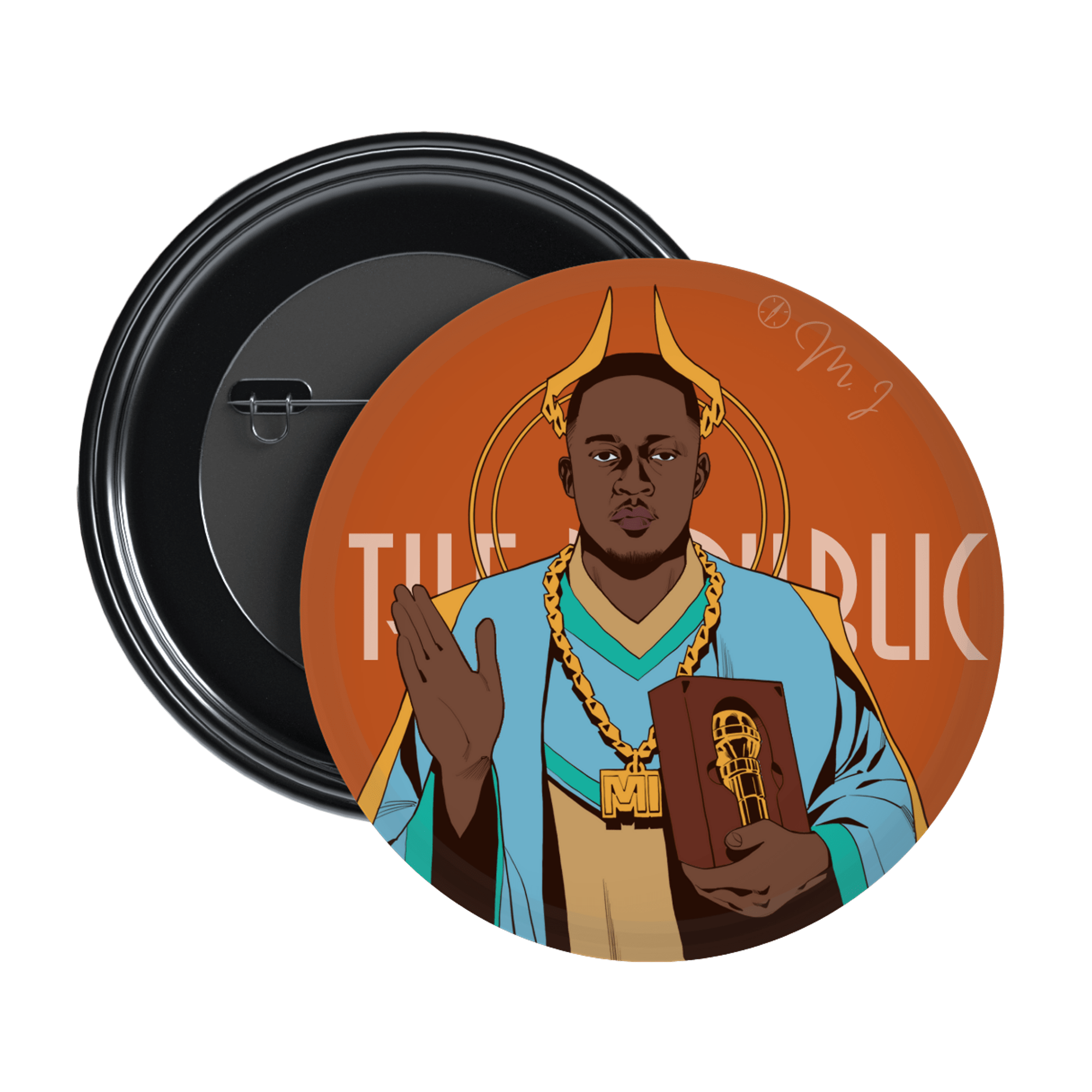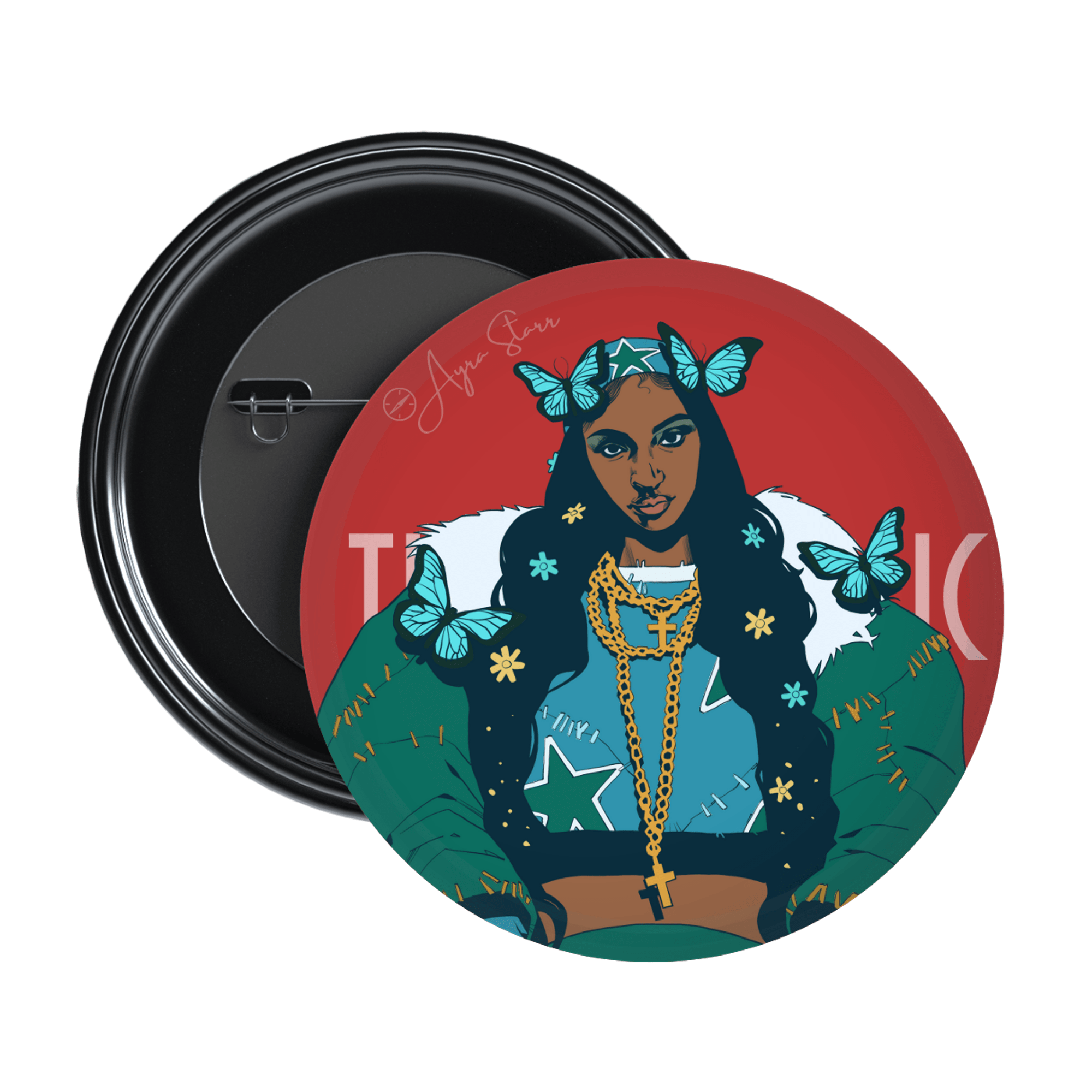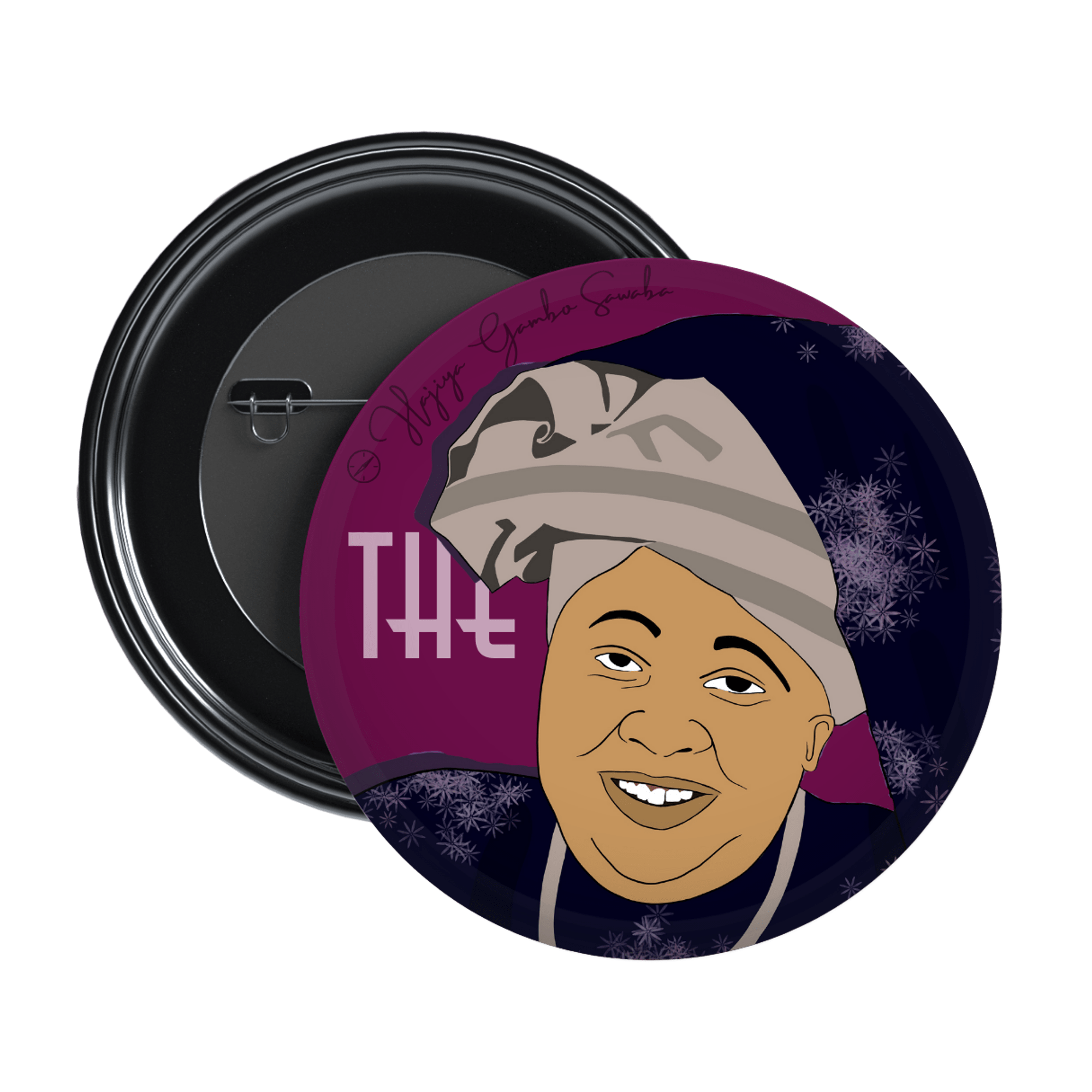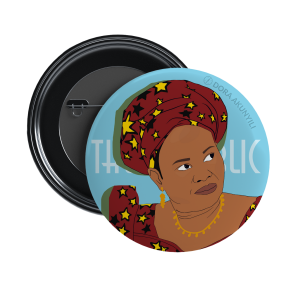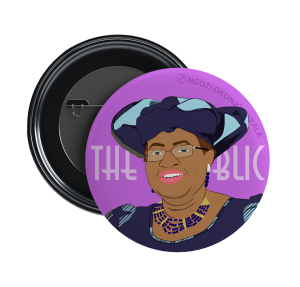THE REPUBLIC INTERVIEWS
‘It Is Not Feminism If It Is Not Political’
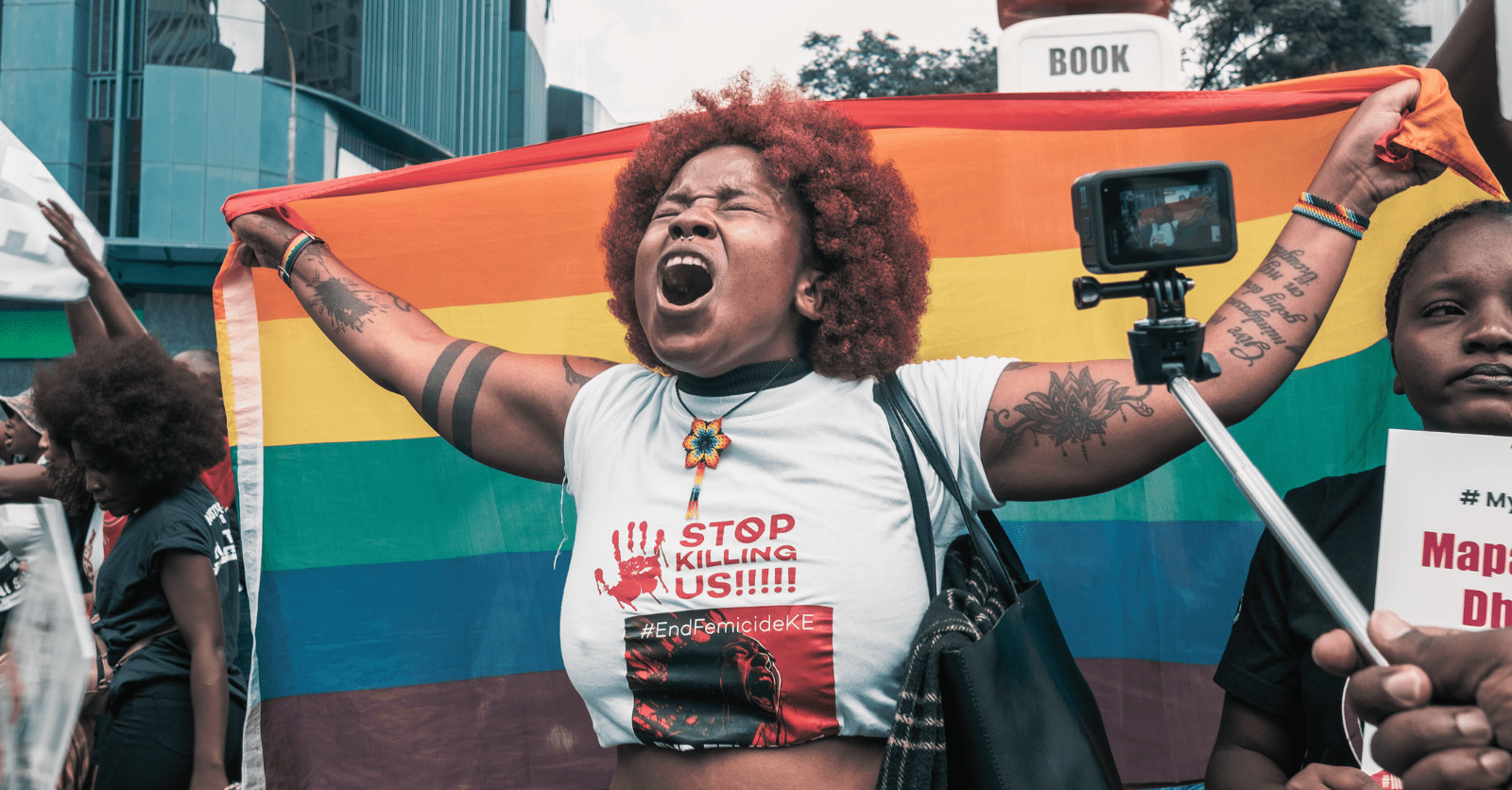
Protesters in the #TotalShutDownKE march, protesting against the recent rise of disturbing femicide incidents in Nairobi, Kenya, 2024. Photo: George Muriama / FLICKR.
THE REPUBLIC INTERVIEWS
‘It Is Not Feminism If It Is Not Political’
Support for this interview came from the Open Society Foundations Ideas Workshop.
We are tired of being unsafe in our own country,’ Nancy Houston, the co-founder and executive director of Feminists in Kenya, told me on an erratic zoom call a few weeks ago. She was in Nairobi, where Feminists in Kenya is headquartered, and I was in Lagos. Feminists in Kenya is a feminist movement and one of the conveners of the anti-femicide protests that took place across Kenya earlier this year in January. I had followed the protests and had reached out to Houston, wanting to know more about the situation on the ground. We had been trying to have this conversation for some time and had needed to reschedule our call at least once. Finally, we were speaking: it was late March, only a few days since Kenya, Nigeria and several other African countries reported severe internet downtime following damages to undersea telecoms cables that serve our countries. Incidentally, the internet, specifically the impact of social media on African feminist movements, was among what I planned to discuss with Houston. From Nigeria’s 2018 #MarketMarch protests to Namibia’s #ShutItAllDown of 2020, social media had, in recent years, come across as a unique boon to feminist protests. Platforms like X (formerly Twitter) and the unique ability to coordinate discussions and thus communities around hashtags, had transformed the internet for activists generally. Such advantages meant that through the internet, Houston explained, ‘we’ve gotten so many opportunities…and we’ve been able to create alliances with multiple feminists.’ But with social media platforms increasingly prioritizing monetization and promoting algorithmic over organic curation, was social media becoming dangerous for activists? ‘I think the internet for us has been a double-edged sword,’ Houston said. Additionally, ‘there is a form of right-wing digital content that is actually spreading so fast. And this content is also radicalizing a lot of men who exist online. So, it’s like the patriarchal violence that exists offline, has moved online as well.’
Together with Kenyan human rights lawyer, Vivian Ouya, Houston founded Feminists in Kenya in 2019 following the protest, #TotalShutdownKenya. That protest was also anti-femicide, which left me with several questions: did #TotalShutdownKenya not achieve its goals? What had happened since then? Did the need for the January 2024 protests suggest that femicide was on the rise or that social media-enabled activism was ineffective? In discussing these questions, I wanted to understand more about feminist organizing in Kenya: the conditions in which feminists organized; how organizations like Feminists in Kenya were staying afloat; what funding and collaborations looked like. The result was a conversation in which Houston not only shared how Kenya’s feminist landscape has evolved since #TotalShutdownKenya, but also highlighted the unique challenges confronting Kenya’s feminist movements: ‘the more we grew,’ she explained, ‘the more we felt like we were being pushed to organize in a certain NGO-ized way.’ Likewise, she outlined the emergent opportunities such feminists are seizing. ‘[T]he resilience of Black feminist activists who are on the front line is highly valuable,’ she said. ‘They are waking up, and they are imagining alternative realities for African women. And they’re saying that this can’t be it for us, what else is there for us as African women?’
Our conversation continues below and has been edited for brevity and clarity.
WALE LAWAL
The first thing I really wanted to get a sense of is the context behind the anti-femicide protests. In news reports I’ve seen, the protests have been represented as a major development. We know that it’s not the first protest of its kind, particularly in Kenya, but I wanted to understand, at least in this iteration of the protests, what really happened? What drove the protests? Is there any context that you can share from your own knowledge of what’s been happening on the ground?
NANCY HOUSTON
On 27 January, earlier this year, Feminists in Kenya in collaboration with Usikimye, and Zamara Foundation called for a nationwide protest against femicide. So, these two organizations, Usikimye and Zamara, are also feminist organizations that we collaborate with. And also, just to give you a brief about the femicides statistics, currently, the Africa Data Hub has reported that from January 2016 to December 2023, over 500 cases of femicide were recorded in Kenya. But then in January 2024, alone when we were marching, over 30 women had been killed in intimate partner violence, femicide cases. So, they were killed by people who actually know them.
So, our premise for this march was that we are tired of being unsafe in our own country. We were basically saying that enough is enough. We are tired of the inaction by the government to centre femicide and gender-based violence as one of the biggest challenges facing Kenyan women currently. And our premise was also the fact that women in Kenya are more than half of this country’s population. We pay taxes in this country, we live in this country, we vote and elect leaders in this country, and our labour is very significant in the growth of our country’s economy. But the message that we are constantly getting as women is that our lives is not a priority. And so, that is really why we were marching.
We were saying that why is it so easy for our lives to be so easily discarded, that we can be killed that women can be killed in Kenya that women can be maimed? And the resulting discourse that we get is that, you know, we are being blamed, so victim blaming narratives and a lot of misogynistic online talking points. So, like I’ve said, we’re simply saying enough is enough. And some of the demands that we were asking the government is that we wanted femicide to be declared a national emergency. That was the first demand. The second demand was that we wanted the Government of Kenya to work in consultation with young Kenyan feminist activists to develop a commission on the elimination of femicide. And finally, we wanted the government to recognize femicide, specifically as a crime in the penal code of Kenya.
WALE LAWAL
You mentioned that there’s data from as far back as 2016. Do feminists in Kenya consider femicide to be a long running issue or a problem that has been increasing in recent years?
NANCY HOUSTON
In all honesty, Wale, I definitely think that femicide has persisted as a longstanding issue in Kenya for the longest time. I mean, this is a challenge that we’ve dealt with for a long time. And also just on the continent, if you look at Zambia, if you look at South Africa, and if you look at Nigeria. I think that African women and African feminists have been on the front line for the longest time talking about femicide and ending gender-based violence (GBV) because it is difficult for us as African women to progress, to move on, to have an economic reality that is sound, if we are dealing with femicide, if we are not safe. So yeah, this is a challenge that a lot of us have been dealing with in Africa. Also, I want to say that the current surge in the media coverage is not some sudden emergence of the problem. Like you know, it’s not new. It’s a result of the relentless efforts of feminist collectives, feminist movements and civil society organizations, who have all worked tirelessly to bring it to the forefront. So, for me, I would say that if we look at history, traditional patriarchal structures; at patriarchy as a system of power, things like economic disparities and culture, for example, female genital mutilation (FGM); these are things that perpetuate gender inequality and have contributed to the persistence of femicide in Kenya.
But like I have mentioned, grassroot movements and women’s rights organizations are really working to advocate for multiple legislative reforms to raise awareness to provide support services for victims of femicide in domestic violence. So, everybody that I know, at least in this space, is really trying as much as possible to raise awareness on femicide. But I also think that—I don’t know was it in 2015, or there abouts?—feminists in Kenya, not our organization, just the movement of feminists in Kenya had initiated a campaign called, ‘My Dress, My Choice’. In this campaign, they were rejecting the patriarchal idea that our bodies as women do not belong to us and they were saying that, in fact, we have autonomy and agency over our own bodies. This was a period in time in Kenya when women would wear short skirts or like tight dresses, or, you know, these dresses that are considered ‘immoral’. They would have motorcycle riders literally removing the clothes off them. So, there was a campaign called ‘My Dress, My Choice’ to reclaim our power in our agency over our own bodies and saying that our bodies are our own, we can wear what we want. ‘My Dress, My Choice’ is the immediate first protest that I remember that was putting these issues on the front line. And then, in 2019, of course, feminists in Kenya did a nationwide march called #TotalShutdownKenya. And here we were raising awareness on GBV and femicide. And we do have challenges, by and large, as feminist organizations. We have challenges, including limited resources. We have a lot of people who are resistant to our cause, a lot of deep-seated misogynistic attitudes and mindsets, but we are steadily pushing. And we hope that by creating a lot of awareness around femicide, we will be able to push for some systemic changes around it.
WALE LAWAL
You mentioned that femicide isn’t just an issue that Kenyan feminists are facing or trying to address. It occurs in multiple African countries. You mentioned South Africa, there’s Nigeria and so on and there’s, of course, you know, what we’re seeing happening in the Gambia, where there’s been this push to bring back female genital mutilation. So, I wanted to ask, to what extent is the anti-femicide movement, as you’ve seen it, as you’ve experienced it in Kenya, an African movement? Are there exchanges, you know, other connections being formed between organizations in Kenya and those in other African countries? Is Feminists in Kenya, your organization, working in collaboration with any organization outside of Kenya? To what extent are you able to exchange ideas and resources beyond Kenya?
NANCY HOUSTON
I think that’s a very interesting question. Because when we say, ‘to what extent is the feminist movement, pan–Africanist?’ this really gets me because I’ve spoken with a lot of men who are not necessarily feminist, but identify as pan–African. And in their cause, in the pan–African cause, women’s rights are not included. This really gets me because if you are pan–African, and women in Africa, African women born in Africa, are saying that they don’t feel safe in this continent, in their countries, how does your pan–Africanist cause align with women’s rights? To what extent can we as African women say that Africa, this continent, is ours, and that we can identify with this continent, and that we can feel safe in this continent? So, I don’t know. I constantly question that. Because as a pan–African myself, I do want to feel like I am connected to this continent. But sometimes I also sit back and say, is this it for us? Is this it for African women? And I’m sure there’s a woman in Zambia saying, is this it, you know, is this all that the continent has to offer us? But yeah, that’s just a roundabout question. It’s a question that I constantly think about. On feminist alliances across the continent, I have to say yes. Yes, we saw connections, for instance, when we organized the march in 2019. We actually adapted the #TotalShutdownKenya march from the marches that happened in Zambia and South Africa. We saw South African women doing #TotalShutdownSouthAfrica. And because we were going through the same thing in Kenya, we also decided to do #TotalShutdownKenya. So, to that extent, I think that there’s a connection.
WALE LAWAL
One thing that’s also been a long running thread across the different feminist marches that we’ve seen is the role of the hashtag, social media, the internet. And of course, you know, these days, the internet, social media has also gotten a lot of pushback because platforms are no longer as reliable. I wanted to understand your experience of digital-enabled activism. How have you found the internet to be useful, particularly in the recent anti-femicide protest? Have you had challenges with using the internet? Are there ways in which you’re thinking about organizing beyond using social media?
NANCY HOUSTON
I think the internet for us has been a double-edged sword. On one hand, it has absolutely given us this incredible visibility. Our work has reached so many places. We’ve gotten so many opportunities because of our presence on the internet, and we‘ve been able to create alliances with multiple feminists. We’ve been able to have a sense of collectivism and solidarity with other feminists around Africa. That is one side of the internet. But on the other side, the internet has been terrible. It‘s been terrible because an emerging problem is of course technology and safety. For us as Black women who exist online, we feel like when we are visible, we are made to be hyper–visible, so that every tiny thing that we are doing is hyper–visibilized. And when we are hyper-visible, that means that we are opened up to more online violence. And right now, I also think that there is a form of right-wing digital content that is actually spreading so fast. And this content is also radicalizing a lot of men who exist online. So, it’s like the patriarchal violence that exists offline, has moved online as well. And I think that there’s a direct link between femicide and the growth of online manosphere spaces that exploit immense feelings of alienation and anxiety among men and then provides these men with some sort of distorted feelings of power over something or over somebody. So, for example, if a white man exists online, it is easy to radicalize him with content that speaks to having supremacy over everyone. And if a Black man exists online, it is also very easy to radicalize him with content that speaks to the supremacy over women, specifically Black women, and so because of this false—
Nancy’s connection broke at this point, but she successfully reconnected.
shop the republic
WALE LAWAL
I think the last thing we got was you were discussing how the fast spread of right-wing digital content is radicalizing men. You were telling us about how it is easy, for example, with Black men, to radicalize them with information that’s all about Black men dominating women, Black women in particular. We were talking about that kind of framework in which the internet is now amplifying anti-women messaging, or at least, patriarchal messaging towards men.
NANCY HOUSTON
Yes, of course. And I think that men then get this false sense of power. To some extent, I feel like people online or men online, who have been socialized to think in this patriarchal way in this negative way, are looking for some false sense of power; they’re looking for some sort of leadership, or some way to at least provide some sort of leadership for them in using to perpetuate some very vicious, anti-gender rhetoric that that has become very harmful. It is very dangerous to other us, to other marginalized people, to other women to other sexual and gender minorities.
WALE LAWAL
Can you tell us a bit more about the timeline of Feminists in Kenya? Can you tell us more about the organization, about when it was founded? And then I still have some additional questions around initiatives like #TotalShutdownKenya. But to start with, I wanted to understand more around the motivation for founding Feminists in Kenya, the situation on the ground when Feminists in Kenya was first founded, and how the organization has evolved over time.
NANCY HOUSTON
Feminists in Kenya was first founded in 2019 when the #TotalShutdownKenya march happened. So, before Feminists in Kenya was founded, we were multiple feminist activists existing on multiple online platforms. And we would create a lot of feminist political education online. So, we were known for feminist content and feminist education. We were very radical with it. We would speak truth to power, we were very disruptive. And so, at this point when, in 2019, we witnessed a lot of heightened cases of femicide, we came together as a group of feminist activists who have been existing online for a period of time. And because for most of us, our posts were very visible and used to go viral, we called for a feminist march called #TotalShutdownKenya. This was after we had seen the South African feminists and I think Zambian feminists also organizing, total shutdowns in their countries. We collectively came together and organized #TotalShutdownKenya in 2019. That was how Feminists in Kenya was born.
WALE LAWAL
And how would you say Feminists in Kenya has evolved over the years?
NANCY HOUSTON
Over the years, I think that the nature of our activism has changed significantly. And this is coming from the pressure of being forced in a way to be more organized. You know, when you’re running a feminist movement, it is a movement. You want everybody to identify with it. You do not want bureaucracies to surround it. Because it’s a political agenda, right? But the more we grew, the more we felt like we were being pushed to organize in a certain NGO-ized way. That is how we felt. And fundamentally for you to get resources, because feminists, especially some young feminist movements, were not very resourced, we felt like we were being pushed to organize in a bureaucratic NGO-ized way, so that we would be able to get resources to continue our work. But we try as much as possible to maintain that political aspect of our movement because for us, it is not feminism, if it is not political. And so currently, our strategies for organizing are divided into four thematic areas. The first one is feminist movement building, where we want young feminists to identify with our movement and to build feminist leadership. We want as many people as possible to identify with feminism as a political project. And then we have the second theme as a movement to end all forms of violence against women and gender and diverse people, where we work with queer people and other marginalized folk to ensure that we are centring violence in the conversation and raising feminist strategies to end violence. And then the third one we have is feminist technologies. Here we are looking at the relationship between our existence on the internet and power. So how does that work? We are talking about digital security; we are talking about Black women in technology. Who owns the internet? We are disrupting power on the internet, just having discourse around that. And then the final one is reclaiming our sexual rights as, as Black women. We definitely believe that our bodies are our own and that we have to reclaim it.
WALE LAWAL
You mentioned that you felt like your organization, Feminists in Kenya, was being pushed to organize in an NGO-ized bureaucratic way. What does that mean, compared to how you were organized before that?
NANCY HOUSTON
Previously, our writing our thinking, the discourse that we would put out was very radical. It was not mainstream. If you compare a women’s rights organization and a feminist movement, the way they even develop communication strategies, the way they communicate on the internet is very different. A women’s rights organization is more likely to be formal in the way they communicate, bureaucratic. And this, and this doesn’t mean that bureaucracy is bad. We just think that bureaucracy does not get us anywhere. For us to see changes as women in Kenya and as women in Africa, we feel that somebody has to disrupt something. So that is the political project that we want to maintain, our disruptive nature as a feminist movement. We do not want to be co-opted, by the government, by NGOs, by the NGO industrial complex or by whatever complex that exists out there. We want to maintain our politics because we believe that it is through the politicization of feminism, the politicization of this movement, that we can be able to see change.
shop the republic
WALE LAWAL
And how have you been able to achieve this? The reason I ask this is, this interview will be read by people who are either thinking of setting up their own feminist organizations or might already be running feminist organizations and facing similar challenges with feeling pressure to go the women’s rights organization route. I know that you’ve mentioned you’ve had challenges around funding and resources. But how are you still able to maintain your political agenda, despite these pressures?
NANCY HOUSTON
First, I do think that there are feminist funders who understand that we need to be political to be free. For us to get liberation, we must be political. And we are eternally grateful to the feminist funders who have found us and who see the work that we do. And specifically, as Black feminist activists, it’s difficult for us to be seen, because we are on the intersection of being Black. We are on the intersection of being women. Some of us have been survivors of violence. Some of us are sex workers. I mean, our identities are on the margins, very far on the margins. And so, we are definitely grateful to the feminist funders who have resourced our movements, and who understand the importance, the significance of us, maintaining the political agenda of our feminist movement. But also, just the resilience of Black feminist activists who are on the front line is highly valuable. They are tirelessly pushing for substantive reforms. They are creating feminist political education and building feminist political consciousness for masses of people. They are waking up, and they are imagining alternative realities for African women. And they’re saying that this can’t be it for us, what else is there for us as African women? And they are pushing boundaries, they’re making the unconventional, conventional. They’re creating initiatives and activities that are pushing for these systems to be dismantled I think that resilience is what is keeping us going.
WALE LAWAL
Would you be able to name any of those feminist funders, maybe one or two?
NANCY HOUSTON
Yes, of course. But, for what purposes? Would it be put in the writings?
WALE LAWAL
Yes. We just want to provide as much detail as possible. And of course, if you’re not comfortable providing this, that’s totally fine.
NANCY HOUSTON
No, it’s okay. I can mention them because this is what I tell young feminist activists. When I meet them, they’re always saying, ‘Nobody sees our work. Nobody wants to fund our work.’ But I’m like, you need to target the right funders. So, for instance, we have Black Feminist Fund. I think they were founded about two years ago. The first time we applied we got the funding. They immediately saw our work. Black Feminist Fund is definitely a great feminist funder. We also have Frida Fund, which really recognizes the work that young feminists do. We have Numun Fund as well. Numun Fund funds feminists who work on the intersection of technology, power, and the internet. Those have been great feminist funders for us, and I think more young feminists need to know about them.
WALE LAWAL
I wanted to go back a bit to #TotalShutdownKenya, which was, you mentioned, what catalyzed the founding of Feminists in Kenya. Beyond the forming of Feminists in Kenya, what else came out of that protest? How did the government respond? What were the key reactions? Was any of it substantial?
NANCY HOUSTON
The government did respond. They responded by joining us in the march, which was a great show of co-optation. I’m saying it’s co-optation because I felt like for them, it was optics. You know, when the government or a woman representative from the government realizes that, ‘oh, my God, these women are going to be marching. My office is going to be put into question. Let me join them, provide some T shirts here and there, provide some drinks and waters in there.’ It’s optics. That is co-opting a movement, you know, zero meaningful changes, just optics. So yes, they did join us and there were optics, and there was all of that. But I also want to acknowledge that the president at the time did mention that femicide was an existing challenge in his 2019 State of the Nation Address. So, I thought that was fair. I can also mention that they organized a vigil in collaboration with multiple women’s rights organizations, and then included feminists who did the hard labour of organizing the march as an afterthought in their vigil. This vigil was to commemorate the lives lost to femicide. But again, for me, I definitely think it was for optics, not very political. And yeah, that is how they supported ‘the march’. But for me, I feel like it is important to stress that after feminists have done the hard labour of organizing these protests, that hard labour of centring feminist conversations about femicide, putting it to the centre, and having it trend on social media in Kenya for a while, it is important that when the government comes on board, as people who are have the systemic power to change things, it is important for them to not to act in a vacuum. It is important for them to be deliberate in involving Kenyan feminists so that we can be able to provide feminist solutions together.
shop the republic
WALE LAWAL
Since #TotalShutdownKenya, or even ahead of the most recent anti-femicide protests, what are some of the other ways in which Kenyan feminists have intervened against femicide beyond protests? Here, what I’m trying to understand is, we know that there are some incredible challenges. We know that there’s been incredible resistance from society. But are there signs that anything is working? What seems to be working? When you think about the impact that feminists are making, particularly in the areas of pushing against femicide, beyond protests, what does impact look like? And it could be something that’s very small, it could be small initiatives. What are some of the changes that you are registering as successes beyond protests?
NANCY HOUSTON
If I compare 2019 to now, I think that a lot more men are willing to have to have some sort of respectful and honest conversation with feminists. In 2019, or around 2015 to 2019, so many men were resistant to feminism, but now I feel like they are more accepting, they are more willing. So, for me, I see that feminists have definitely worked for mindsets to be shifted. A lot of men have a different mindset currently. So, I think that is that is a plus. Yes, that‘s definitely a plus.
WALE LAWAL
Let’s come back to the current state. What is the situation on the ground now? The protests have happened. A lot of us around the world have seen it. How are Kenyan feminists feeling at the moment? What has been the government’s response so far?
NANCY HOUSTON
Well, first, the protest was attended by over 10,000 people in Nairobi, and over 30,000 people in other cities in Kenya. So, because of the visibility that we got from the protest (also I think that our set of demands were really well written), it has led to the formation of a special team to probe femicide cases by the DCI. (DCI is Director of Criminal Investigations in Kenya.) So, they announced that they are creating a special team to probe femicide cases and I think that’s a positive outcome. And also, the Office of the Chief Justice in Kenya announced that they’re opening sexual and gender-based violence children’s courts across the country. That’s another plus for us. What was the other part of the question?
shop the republic
WALE LAWAL
I was also asking that beyond Feminists in Kenya, the organization, this is just Kenyan feminists in general, what is the mood at the moment? Is this something where feminists are feeling like there’s been some incredible achievement? Is it more like a mood of the government needs to do more? How are feminists in Kenya feeling at the moment, following protests?
NANCY HOUSTON
We are feeling united as women, and not necessarily even feminists. Women in Kenya feel like we are united in this cause to end femicide. It is a movement, you don’t even have to identify as a feminist, and there are men who have joined the movement. And the mood is that femicide needs to end. We can’t keep on talking about femicide every time and nothing is done. So, it is a solid movement, and we are all responding to it as one. I think that is the mood. And women are just feeling like we are together in this. Yeah, that is it. That’s what I feel. It’s like we are together in this.
WALE LAWAL
Thanks so much, Nancy. My final question is, what does your organization believe to be the most important next step at this time? You’ve mentioned a number of initiatives that are now coming and a number of results that the protests have been able to generate. The special teams to probe femicide cases, the courts looking at sexual and GBV cases. Beyond those, for you in your organization, what is the most important next step at this time?
NANCY HOUSTON
For us, it is of course, to continue developing and curating our activities and our programming on femicide. We recently had the Feminist Transformative Justice Institute. In this institute, we are unpacking the colonial legacies of the criminal justice system. We are asking the question, is the criminal justice system enough for survivors of violence? Do survivors get support in this justice system? Is the criminal justice system the only route for justice? What are the alternative ways of getting justice that centre victims and their families? So, we had the first cohort and we’re hoping that we’re going to have the second cohort so that we continue having these conversations. But also, I think that for us what is most important is that we must continue the momentum that we have currently built. We must continue as feminists to collectively strategize. We must strategically build alliances that work for us. And that means we have to really think about building alliances with our allies in the government who can push new laws for us that address femicide. And of course, we must also tirelessly as feminists work together to follow up on the memorandum of demands that we submitted to the government when we marched on 27 January⎈
As we wrapped up the interview, I requested more details on the Feminist Transformative Justice Institute, including when it began, how it is funded and its typical cohort size. According to Houston, the institute launched between 2022 and 2023 through funding from the Black Feminist Fund. They have held one cohort of around 15 people and have now received funding to run another cohort.




